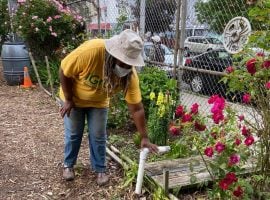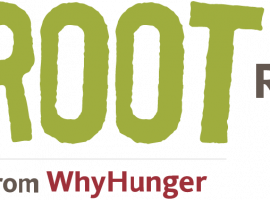I’m serving as a FoodCorps mentor this year, which means that I’m getting to know the stellar Casey Hancock, who is spending her year teaching food and garden education in New Hanover and Brunswick counties in North Carolina, hosted by nonprofit Feast Down East. Along with working with kids and gardens, she’s exploring her own interests in various aspects of sustainable agriculture, food system change and food justice. She shared an experience she had volunteering on the Martin Luther King, Jr. holiday last month.
Highlights from a Day of Service at LINC Farm by Casey Hancock, FoodCorps Service Member I am typically found teaching third graders about science, gardening and nutrition; building and tending school gardens; and connecting local farmers to cafeterias through fresh produce promotions. On the Martin Luther King, Jr. holiday this year, though, I swapped my usual school gardens for the chance to work at the LINC Farm, with a different part of the community. It is imperative to teach children about food at a young age, as I’ve been doing, but fundamentally, food is a community-wide issue.
[slideshow id=37 template=caption] It was a busy weekend at the newly-established LINC Farm. LINC, Leading Into New Communities, is a non-profit organization in the Wilmington, NC, area that strives to empower people with criminal histories and at-risk youth to make positive choices in order to become productive members of society. The organization’s transitional facility, which can house twenty men and twenty women, was brimming with positive energy all weekend as it prepared the new farm site. The farm will teach residents about sustainable agriculture, while providing them with fresh produce and generating funds through vegetable sales so that the organization can rely less on grants.
Three of us local long-term volunteers–Feast Down East VISTA member Erin O’Donnell, FoodCorps Fellow Sebastian Naskaris and I–all rallied our networks to take part in a day of rewarding service following a crop mob that took place on Saturday of the weekend.
Over the course of the weekend, the transformation of the property was incredible. We harvested bamboo, bushwhacked invasive species and brush to make room for vegetable plots, crafted bamboo trellises, and sorted through bricks and concrete buried in the soil. Best of all, we all broke for a delicious lunch donated by local farmers and businesses. As we watched President Obama’s second inauguration, we also heard from Senior Corps members about their experiences during the Civil Rights movement. It was a powerful and productive event, ultimately celebrating the diversity and strengths of the community.
After studying theory on community development at the University of Vermont, it was enlightening to actually experience bottom-up development with community members actively involved. To see residents join outside volunteers in working to turn a neglected property into productive farmland was so much more than physically rewarding. The event fostered community building, sustainability and awareness – and provided an opportunity for people to reconnect and improve food security in a pragmatic way.





